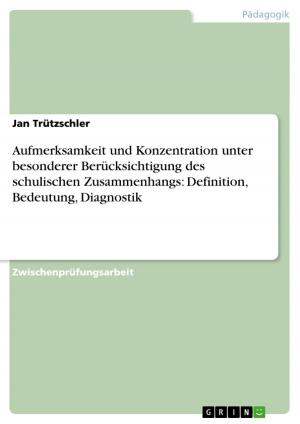| Author: | Annika Lüchau | ISBN: | 9783638415644 |
| Publisher: | GRIN Verlag | Publication: | September 7, 2005 |
| Imprint: | GRIN Verlag | Language: | English |
| Author: | Annika Lüchau |
| ISBN: | 9783638415644 |
| Publisher: | GRIN Verlag |
| Publication: | September 7, 2005 |
| Imprint: | GRIN Verlag |
| Language: | English |
Seminar paper from the year 2005 in the subject English Language and Literature Studies - Linguistics, grade: 2,0, Ruhr-University of Bochum, course: Child Language Acquisition, 8 entries in the bibliography, language: English, abstract: This paper will try to analyse if bilingualism brings an advantage or if it has to be seen as a drawback. At first, an overview of bilingualism is given., how does it come that people can be bilingual and how the term has been defined by different linguists is depicted. Furthermore, the different theories concerning the best age for learning and models describing the acquisition of language are introduced. Then further emphasis is set upon positive and negative effects of learning two languages. A study, in which the reading competence of monolingual and bilingual pupils has been compared, is depicted and an evaluation of the study is given. ?ilingualism2. The term 'bilingual' has been interpreted and acknowledged differently from various linguists. Webster states that bilingual means 'having or using two languages especially as spoken with the fluency characteristic of a native speaker; a person using two languages especially habitually [...]' and 'bilingualism' as 'the constant oral use of two languages'. To be bilingual indicates the ability to speak two languages perfectly. Having a similar opinion, Bloomfield defines bilingualism as 'the native-like control of two languages.' Bloomfield also calls those bilinguals who are able to use a second language as well as their natives. In contrast to these positive opinions, other linguists have been of a completely different opinion. For Macnamara, a bilingual is anyone 'who possesses a minimal competence in only one of the four language skills, listening comprehension, speaking, reading and writing, in a language other than his mother tongue.' The depicted opinions are of an extreme that hardly go together. However, the term bilingualism is many faceted and has not only one connotation, positive or negative.
Seminar paper from the year 2005 in the subject English Language and Literature Studies - Linguistics, grade: 2,0, Ruhr-University of Bochum, course: Child Language Acquisition, 8 entries in the bibliography, language: English, abstract: This paper will try to analyse if bilingualism brings an advantage or if it has to be seen as a drawback. At first, an overview of bilingualism is given., how does it come that people can be bilingual and how the term has been defined by different linguists is depicted. Furthermore, the different theories concerning the best age for learning and models describing the acquisition of language are introduced. Then further emphasis is set upon positive and negative effects of learning two languages. A study, in which the reading competence of monolingual and bilingual pupils has been compared, is depicted and an evaluation of the study is given. ?ilingualism2. The term 'bilingual' has been interpreted and acknowledged differently from various linguists. Webster states that bilingual means 'having or using two languages especially as spoken with the fluency characteristic of a native speaker; a person using two languages especially habitually [...]' and 'bilingualism' as 'the constant oral use of two languages'. To be bilingual indicates the ability to speak two languages perfectly. Having a similar opinion, Bloomfield defines bilingualism as 'the native-like control of two languages.' Bloomfield also calls those bilinguals who are able to use a second language as well as their natives. In contrast to these positive opinions, other linguists have been of a completely different opinion. For Macnamara, a bilingual is anyone 'who possesses a minimal competence in only one of the four language skills, listening comprehension, speaking, reading and writing, in a language other than his mother tongue.' The depicted opinions are of an extreme that hardly go together. However, the term bilingualism is many faceted and has not only one connotation, positive or negative.















